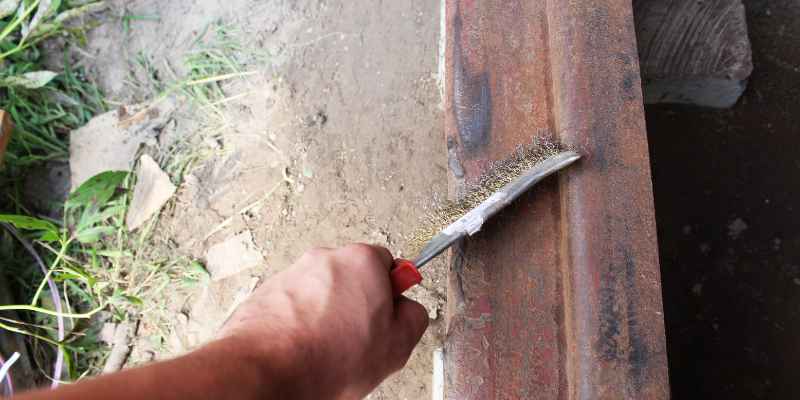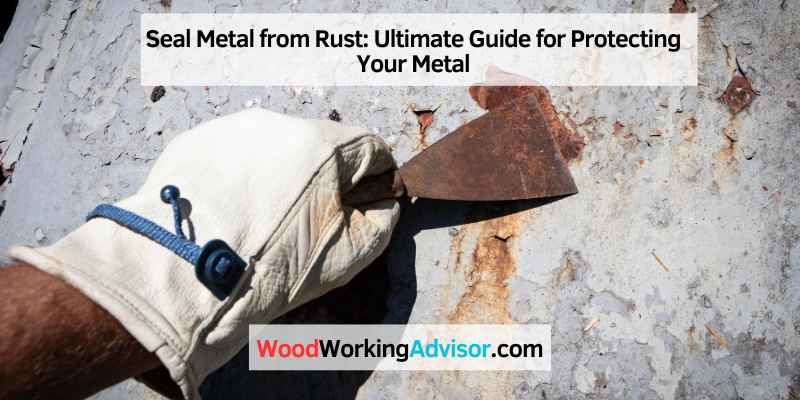To seal metal from rust, apply a rust-resistant coating or sealant.
Understanding Rust
Rust, a reddish-brown coating that forms on the surface of metals, is a common and persistent issue faced by many metal objects. Although rust is often seen as an aesthetic concern, it can also cause structural damage and affect the performance of metal-based items. To effectively combat rust, it is essential to understand the science behind its formation and identify the types of metals that are more prone to it.
The Science Behind Rust Formation
Rust, scientifically known as iron oxide, occurs when iron or other metals come into contact with oxygen and moisture. This process, known as oxidation, happens through a series of chemical reactions. When metal is exposed to air and water, the iron particles react with oxygen molecules to create iron(III) oxide. This iron oxide forms a loose layer on the metal surface and flakes away easily, leading to the corrosion of the metal over time.
Common Types Of Metals Prone To Rust
While rust can potentially affect any metal, certain types of metals are particularly susceptible to its formation. These metals include:
| Metal | Rust Susceptibility |
|---|---|
| Iron | High |
| Steel | High |
| Cast Iron | High |
| Galvanized Steel | Medium |
| Aluminum | Low |
| Stainless Steel | Low |
- Iron: Being the base material for steel and cast iron, iron itself is highly prone to rust formation.
- Steel: Steel, an alloy of iron, is vulnerable to rust due to its high iron content.
- Cast Iron: Cast iron, an alloy of iron containing carbon and silicon, is highly susceptible to rust.
- Galvanized Steel: While galvanized steel is protected by a layer of zinc, with time and exposure, the protective layer can wear off, increasing the risk of rusting.
- Aluminum: Unlike iron-based metals, aluminum has a natural oxide layer that acts as a barrier, providing some level of protection against rust.
- Stainless Steel: Stainless steel contains chromium, which forms a thin oxide layer on the surface, protecting it from rust. However, prolonged exposure to certain conditions can still lead to rust formation.
Understanding the science behind rust and being aware of the common types of metals prone to rust formation allows us to take preventive measures to prolong the lifespan of metal objects. By implementing proper maintenance and protective measures, such as sealants or coatings, we can securely guard against the corrosive effects of rust and ensure the longevity of our metal possessions.
Preventative Measures
Rust can quickly deteriorate metal surfaces, compromising their appearance and structural integrity. Fortunately, there are several preventive measures that can be taken to protect metal from rust. By applying these measures, you can prolong the lifespan of metal objects and maintain their aesthetic appeal.
Priming And Painting Metal Surfaces
Priming and painting metal surfaces is an effective way to create a protective barrier against rust. Prior to applying paint, it’s crucial to treat the metal with a high-quality primer. The primer serves as a base coat that helps the paint adhere to the metal surface, preventing moisture and oxygen from causing rust. When selecting paint for metal surfaces, opt for products specifically designed for this purpose, such as rust-inhibiting paints.
Galvanization As A Rust Protection Method
Galvanization involves coating metal with a layer of zinc to shield it from corrosion. This process is highly effective in preventing rust, as zinc is more reactive than iron. As a result, zinc sacrificially corrodes in place of the underlying metal, forming a protective barrier. Galvanized metal is widely used in outdoor environments where it is exposed to moisture and other corrosive elements.

Chemical Treatments
Chemical treatments are an effective method to protect metal from rust. By utilizing various chemical compounds and treatments, you can significantly inhibit corrosion and prolong the lifespan of metal surfaces.
Applying Rust Inhibitors
Rust inhibitors are widely used to protect metal from corrosion. These chemical compounds, often available as liquids or sprays, create a protective layer on the metal surface, preventing the onset of rust. Regular application of rust inhibitors helps maintain the integrity of the metal and prolong its longevity.
Using Phosphates And Chromates For Rust Prevention
Phosphates and chromates are commonly employed for rust prevention. These chemicals serve as excellent rust inhibitors by creating a protective coating on the metal. Phosphate-based treatments are especially effective for steel surfaces, while chromates are preferred for aluminum to inhibit corrosion.
Natural Remedies
Protect metal surfaces from rust with natural remedies that are safe, affordable, and easy to use. Prevent corrosion with ingredients like vinegar, lemon juice, baking soda, or a combination of oils. Say goodbye to rust and hello to a longer-lasting metal.
Utilizing Vinegar And Baking Soda
Metal objects such as tools, furniture, or outdoor fixtures are prone to rust due to the exposure to moisture. However, you don’t need to rely on harsh chemicals to remove rust and restore the beauty of your metal surfaces. With a few natural remedies, you can protect your metal objects from rust and extend their lifespan.
Utilizing Vinegar And Baking Soda
Vinegar and baking soda, two common household ingredients, can work wonders in removing rust from metal surfaces. The acidic nature of vinegar and the abrasive properties of baking soda make them the perfect natural duo for effective rust removal.
Here’s a step-by-step guide on how to use vinegar and baking soda to remove rust:
- Start by creating a mixture of equal parts white vinegar and water in a container.
- Submerge the rusted metal object in the vinegar solution and leave it for at least a couple of hours.
- After soaking, remove the object from the vinegar solution and rinse it thoroughly with water.
- Next, make a paste by combining baking soda with a small amount of water.
- Apply the baking soda paste to the rusted areas of the metal object.
- Gently scrub the rusted areas using a sponge or a soft brush.
- Rinse the metal object with water to remove any residue.
- Dry the metal object completely to prevent any future rusting.
By utilizing vinegar and baking soda, you can not only remove rust but also prevent its further formation by neutralizing the corrosive effect of rust on metal surfaces.
Applying Linseed Oil Or Beeswax
In addition to vinegar and baking soda, you can also protect metal objects from rust by utilizing natural oils such as linseed oil or beeswax. These oils create a protective barrier on the metal surface, preventing moisture from coming in contact with the metal and causing rust.
Here’s how you can apply linseed oil or beeswax to seal metal:
- Clean the metal surface thoroughly to remove any existing rust or dirt.
- Apply a small amount of linseed oil or beeswax to a soft cloth.
- Rub the cloth onto the metal surface, ensuring an even coating.
- Allow the oil or wax to penetrate the metal for a few minutes.
- Using a clean cloth, wipe off any excess oil or wax.
- Leave the metal object to dry completely.
By regularly applying linseed oil or beeswax, you can provide long-lasting protection to metal objects, keeping them free from rust and maintaining their appearance for years to come.
Maintenance Tips
Discover effective tips to prevent rust on metal surfaces. Regularly clean and apply a protective sealant to inhibit corrosion. Extend the lifespan of your metal items with these easy maintenance practices.
Maintaining your seal metal to prevent rust formation is crucial for prolonging its lifespan. Regular care and attention are essential to ensure the metal stays in top condition. Here are some maintenance tips to keep your seal metal rust-free:
Regular Cleaning and Drying Practices
————————————-
Regularly clean the seal metal surfaces with a mild soap and water solution. Dry the metal thoroughly to prevent water accumulation.
Monitoring for Rust Development
——————————-
Regularly inspect the seal metal for any signs of rust formation. Address any rust spots promptly to prevent further corrosion.
Remember to follow these maintenance tips to protect your seal metal from rust and ensure its longevity.
Advanced Protection Techniques
When it comes to safeguarding metal from rust, employing advanced protection techniques is crucial.
Powder Coating For Long-term Protection
Powder coating provides durable defense against corrosion for an extended period.
It involves applying a dry powder to the metal surface, which is then heated to form a protective layer.
- Seals the metal effectively
- Creates a barrier against moisture and chemicals
Electroplating For A Durable Finish
Electroplating offers a sturdy finish that enhances the durability of the metal.
This process involves depositing a layer of metal onto the surface through electrolysis.
- Enhances the appearance of the metal
- Improves resistance to corrosion
Professionals’ Advice
When it comes to preventing rust on metal, consulting with metal restoration experts can provide valuable insights and recommendations. These professionals possess the knowledge and experience to guide individuals in effectively sealing metal from rust.
Consulting With Metal Restoration Experts
Metal restoration experts can offer customized solutions based on the specific type of metal and the environmental conditions it will be exposed to. By assessing the current state of the metal and identifying potential risk factors for rust, these professionals can recommend suitable sealing methods and products to ensure long-term protection.
Hiring Professional Metal Coating Services
By hiring professional metal coating services, individuals can benefit from the expertise and advanced technology employed in the application of protective coatings. These services typically utilize specialized coatings that are designed to provide maximum resistance against rust, extending the lifespan of the metal.
Frequently Asked Questions On Seal Metal From Rust
How Can I Protect Metal From Rust?
To protect metal from rust, apply a rust-inhibiting primer and a protective coating. Regular maintenance and inspections can also prevent rust formation on metal surfaces.
What Are The Best Sealants For Preventing Rust?
The best sealants for preventing rust include epoxy-based sealants, zinc-rich coatings, and polyurethane paints. These products provide a strong barrier against moisture and oxygen, effectively preventing rust formation on metal surfaces.
Why Does Metal Rust And How Can I Prevent It?
Metal rusts when it comes into contact with oxygen and moisture. Prevent rust formation by applying rust-inhibiting coatings, keeping metal dry, and reducing exposure to corrosive environments.
When Should I Apply A Rust Inhibitor To Metal Surfaces?
Apply a rust inhibitor to metal surfaces at the first sign of corrosion or as a preventive measure. Regular maintenance and inspection can help determine the right time to apply a rust inhibitor and prevent further rust formation.
Conclusion
To effectively protect metal from rust, it is crucial to seal it properly. By following the steps outlined in this blog post, you can ensure greater longevity for your metal items. From cleaning and priming to applying a high-quality sealant, the right approach can make all the difference.
So, take the time to seal your metal properly and enjoy its beauty and functionality for years to come.


